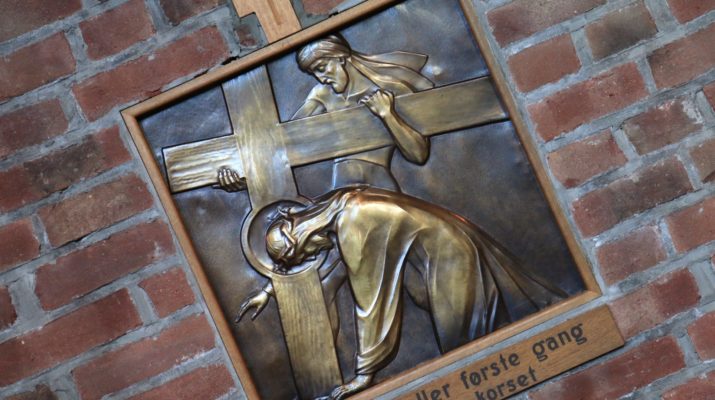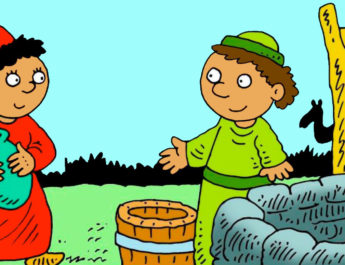Mark 8:27-38
Ordinary B42
27 JesusA went on with his disciplesB to the villagesC of CaesareaD Philippi;E
A “Jesus” = Iesous. From Hebrew Yehoshua (Joshua, the Lord is salvation); {from YHVH (proper name of the God of Israel; the self-existent and eternal one); {from havah (to become) or from hayah (to come to pass, become, be)} + yasha (to deliver, defend, help, preserve, rescue; properly, to be open, wide or free, which implies being safe. So, in a causative sense, this is to free someone)}. This is Jesus or Joshua in Greek – the Lord saves or the Lord is salvation.
B “disciples” = mathetes. From matheteuo (to make a disciple of); from manthano (to learn key facts, gain knowledge from experience; generally implies reflection as part of the learning process); from math– (thinking things through). This is a disciple, learner, or student. It is where we get “mathematics” from.
C “villages” = kome. This is a village as contrasted with a city that has a wall.
D “Caesarea” = Kaisareia. 17x in NT. From kaisar (Caesar, at first a last name, then taken as a title by Roman emperors); from Latin (Caesar); perhaps from Punic caesai (elephant) OR from Latin a cesiis oculis (because of the blue eyes) OR from Latin a caesarie (because of the hair) OR from Latin a caeso matris utero (born by Caesarean section) OR from Latin caedo (to cut). This is Caesarea – part of the name of two cities in Palestine. See https://en.wiktionary.org/wiki/Caesar#Latin.
E “Philippi” = Philippos. From philos (dear, beloved, a friend, an associate; friendship with personal affection, a trusted confidante; love from personal experience with another person) + hippos (horse). This is Philip, meaning one who loves horses or is fond of horses.
and on the wayF he askedG his disciples, “Who do peopleH say that I am?”
F “way” = hodos. This is way, road, path, or journey. It can imply progress along a route.
G “asked” = eperotao. From epi (on, upon, against, what is fitting) + erotao (asking a question or making an earnest request; used when one anticipates special consideration for their request); {from eromai (to ask) OR from ereo (to say, tell, call, speak of)}. This is to question, interrogate, seek, or demand. The questioner is at an advantage – in a preferred position when they make their question.
H “people” = anthropos. Probably from aner (man, male, husband) + ops (eye, face); {from optanomai (to appear, be seen); perhaps from horao (become, seem, appear)}. This is human, humankind. Used for all genders.
28 And they answered him, “JohnI the Baptist;J and others,K Elijah;L and still others, oneM of the prophets.”N
I “John” = Ioannes. Related to “Jesus” in v27. From Hebrew yochanan (Johanan); from Yehochanan (“the Lord has been gracious”); {from YHVH (see note A above)} + chanan (beseech, show favor, be gracious; properly, to bend in kindness to someone with less status). This is John, meaning “the Lord has been gracious.”
J “Baptist” = Baptistes. 12x in NT. From baptizo (to submerge, wash, or immerse; used specially for baptism); from bapto (to dip or dye; to entirely cover with liquid, to stain). This is baptizer or Baptist. The term is only used for John the Baptist.
K “others” = allos. This is other, another. Specifically, it is another of a similar kind or type. There is a different word in Greek that speaks of another as a different kind (heteros).
L “Elijah” = Elias. Related to “Jesus” in v27 & “John” in v28. From Hebrew Eliyyah (Elijah) {from el (God, god) + Yah (the shortened form of the name of the God of Israel; God, Lord); {from YHVH (see note A above}}. This is Elijah, “The Lord is God.”
M “one” = heis. This is one, a person, only, some.
N “prophets” = prophetes. From pro (before, in front of, earlier than) + phemi (to declare, say, use contrasts in speaking to shed light on one point of view); {from phao (to shine) or phaino (to bring light, cause to appear, shine, become visible or clear)}. This is a prophet or poet – one who speaks with inspiration from God.
29 He asked them, “But who do you say that I am?”
PeterO answered him, “You are the Messiah.”P 30 And he sternly orderedQ them not to tell anyone about him.
O “Peter” = Petros. Related to petra (large rock that is connected and or projecting like a rock, ledge, or cliff; can also be cave or stony ground). This is Peter, a stone, pebble, or boulder.
P “Messiah” = Christos. From chrio (consecrate by anointing with oil; often done for prophets, priests, or kings). Literally, the anointed one, Christ. The Greek word for Messiah.
Q “sternly ordered” = epitimao. From epi (on, upon, against, what is fitting) + timao (properly, this is setting a value or price on something, to estimate. Figuratively, it speaks to what level of honor we afford someone or something depending on our personal feeling toward it. By implication, this can mean to revere or honor); {from time (worth or perceived value; literally, price, but figuratively, the honor or value one sees in someone or something; can be esteem or dignity; can also mean precious or valuables); from tino (to pay, be punished, pay a penalty or fine because of a crime); from tio (to pay respect, value)}. This is to render what is due – to assign the value that is appropriate for the situation. So, it could mean to honor or to warn, to rebuke or to charge. Generally, it is a warning meant to guide someone away from doing something wrong or taking the wrong path. It can imply to forbid.
31 Then he beganR to teachS them that the SonT of ManU
R “began” = archomai. From archo (to rule, begin, have first rank or have political power). This is to begin or rule.
S “teach” = didasko. From dao (learn). This is to teach, direct, instruct, or impart knowledge. In the New Testament, this is almost always used for teaching scripture.
T “Son” = huios. This is son, descendant – a son whether natural born or adopted. It can be used figuratively for other forms of kinship.
U “Man” = anthropos. Same as “people” in v27. See note H above.
mustV undergo great suffering,W and be rejectedX by the elders,Y
V “must” = dei. From deo (to tie, bind, compel; declare unlawful). This is what is necessary or proper. It is what is needed or what one should do – a duty or something inevitable. This refers to something absolutely necessary.
W “suffering” = pascho. Akin to penthos (mourning, sorrow). This is to be acted on for good or ill. It is often used for negative treatment. Properly, it means feeling strong emotions – especially suffering. It can also be the ability to feel suffering.
X “rejected” = apodokimazo. 9x in NT. From apo (from, away from) + dokimazo (to test, examine, prove; to approve after subjecting to a test to determine if it is real or acceptable; to test in a literal or figurative sense); {from dokimos (what passes the test, approved, acceptable, genuine, verified); from dechomai (to warmly receive, be ready for what is offered, take, accept, or welcome; to receive in a literal or figurative sense) or dokeo (to have an opinion, seem, appear, suppose; a personal judgment; to think); {from dokos (opinion)}}. This is rejected or disqualified following a test. It is rejected after rigorous investigation and so seen as useless or unworthy.
Y “elders” = presbuteros. From presbus (old man). This is an elder as one of the Sanhedrin and also in the Christian assembly in the early church.
the chief priests,Z and the scribes,AA and be killed,BB and after three days rise again.CC
Z “chief priests” = archiereus. Related to “began” in v31. From archo (see note R above) + hiereus (a priest literal or figurative – of any faith); {from hieros (sacred, something sacred, temple, holy, set apart; something consecrated to God or a god)} This is a high or chief priest.
AA “scribes” = grammateus. From gramma (what is drawn or written so a letter of the alphabet, correspondence, literature, learning); from grapho (to write). This is a writer, scribe, or secretary. Within Judaism, it was someone learned in the Law, a teacher. Also used in the Bible of the town-clerk of Ephesus. See Sirach 38:24-39:11 for a lengthier, positive passage about who scribes were and what they meant in society.
BB “be killed” = apokteino. From apo (from, away from) + kteino (to kill). To put to death, kill, slay. Figuratively, this word can mean abolish, destroy, or extinguish.
CC “rise again” = anistemi. From ana (upwards, up, again, back, anew) + histemi (to make to stand, place, set up, establish, appoint, stand by, stand still, stand ready, stand firm, be steadfast). This is to raise up, rise, appear. It is to stand up literally or figuratively. Can also mean to resurrect.
32 He said all thisDD quite openly.EE, FF And Peter tookGG him aside and began to rebukeHH him.
DD “this” = logos. From lego (to speak, tell, mention). This is word, statement, speech, analogy. It is a word that carries an idea or expresses a thought, a saying. It could refer to a person with a message or reasoning laid out in words. By implication, this could be a topic, line of reasoning, or a motive. It can be used for a divine utterance or as Word – Christ.
EE “openly” = parresia. From pas (all, every, each) + rhesis (speech); {from rheo (say, speak of, command)}. This is confidence, openness, boldness, outspokenness. It can imply assurance – free speech.
FF Literally, “and openly he was speaking the word.”
GG “took” = proslambano. 12x in NT. From pros (at, to, toward, with) + lambano (active acceptance/taking of what is available or what has been offered; emphasizes the choice and action of the individual). This is to take aside, accept, receive, or welcome. It can be to take in a friendly or hospitable sense or to eat (i.e. take food).
HH “rebuke” = epitimao. Same as “sternly ordered” in v30. See note Q above.
33 But turningII and lookingJJ at his disciples, he rebuked Peter and said, “GetKK behindLL me, Satan!MM
II “turning” = epistrepho. From epi (on, upon, among, what is fitting) + strepho (to turn, change, turn back, be converted; to turn around completely to take the opposite path or a completely different one); {from trope (turning, shifting, a revolution; figuratively, a variation); from trepo (to turn)}. This is to turn, return, or come again. It can also mean to revert. It is turning in a literal or figurative sense – also a moral turning.
JJ “looking” = horao. Related to “people” in v27. See note H above.
KK “get” = hupago. From hupo (by, under, under the authority of) + ago (lead, bring, guide, spend, drive, carry). This is to lead under so to depart, go away, or die. It is to lead away under the command of someone else, being given a mission or objective to carry out.
LL “behind” = opiso. Related to “people” in v27 & “looking” in v33. From the same as opisthen (after, back, from the rear); probably from opis (back); from optanomai (see note H above). This is back, behind, after.
MM “Satan” = Satanas. From Hebrew satan (adversary, Satan); from satan (to be an adversary, attack, accuse, resist). This is Satan, the adversary, or an adversary.
For you are setting your mindNN not on divineOO things but on humanPP things.”
NN “setting…mind” = phroneo. From phren (diaphragm, heart, intellect, understanding; figurative for personal opinion or inner mindset; thought regulating action; sympathy, feelings, cognition); perhaps from phrao (to rein in or curb). This is to think, judge, use one’s mind, have an opinion, shape one’s opinion through action.
OO “divine” = theos. From Proto-Indo-European origins, meaning do, put, place. This is God or a god in general.
PP “human” = anthropos. Same as “people” in v27. See note H above.
34 He calledQQ the crowd with his disciples, and said to them, “If any wantRR to become my followers,SS
QQ “called” = proskaleo. From pros (at, to, toward, with) + kaleo (to call by name, invite, to name, bid, summon, call aloud); {related to keleuo (to command, order, direct); from kelomai (to urge on)}. This is to call to oneself, summon.
RR “want” = thelo. This is to wish, desire, will, or intend. It is to choose or prefer in a literal or figurative sense. It can also mean inclined toward or take delight in. It can have a sense of being ready to act on the impulse in question.
SS “become my followers” = opiso + ego + erchomai. Literally, “come after me.” Opiso is the same as “behind” in v33. See note LL above.
let them denyTT themselves and take upUU their crossVV and followWW me.
TT “deny” = aparneomai. Related to “openly” in v32. 11x in NT– 8x of Peter’s denial of Jesus, 2x “let them deny themselves and take up their cross and follow me” (Mt 16:24 & Mk 8:34), 1x “whoever denies me before others will be denied before the angels of God” (Lk 12:9). From apo (from, away from) + arneomai (to deny, disown, refuse, repudiate someone or a previously held belief, to contradict); {from a (not) + rheo (see note EE above)}. This is a strong denial or rejection – utter denial, disowning, or repudiation.
UU “take up” = airo. This is to lift up in a literal or figurative sense. So, it could mean to lift, carry, or raise. It could also imply lifting something in order to take it away or remove it. Figuratively, this can be used for raising the voice or level of suspense. It can mean sailing off as raising the anchor. It can also correspond to a Hebrew expression for atonement of sin (lift/remove sin).
VV “cross” = stauros. Related to “rise again” in v31. From the same as histemi (see note CC above). This is an upright stake, cross. Literally refers to the horizontal beam of a Roman cross, generally carried by the one convicted to die.
WW “follow” = akoloutheo. From a (with, fellowship, union) + keleuthos (road, way). This is to accompany or follow someone, especially the way a disciple does.
35 For those who want to saveXX their lifeYY will loseZZ it, and those who lose their life for my sake, and for the sake of the gospel,AAA will save it.
XX “save” = sozo. From sos (safe, rescued, well). This is to save, heal, preserve, or rescue. Properly, this is taking someone from danger to safety. It can be delivering or protecting literally or figuratively. This is the root that “savior” and “salvation” come from in Greek.
YY “life” = psuche. From psucho (to breathe, blow). This is breath, the breath of life, the self, individual, soul. This is the word for that which makes a person unique – their identity, will, personality, affections. This isn’t the soul as the immortal part of us, but as our individuality. It is also not life as a general concept, but specific to people. This is where the words psyche and psychology come from.
ZZ “lose” = apollumi. From apo (from, away from) + ollumi (to destroy or ruin; the loss that comes from a major ruination). This is to destroy, cut off, to perish – perhaps violently. It can also mean to cancel or remove.
AAA “gospel” = euaggelion. Related to “get” in v33. From eu (well, good, rightly) + aggelos (angel, messenger; a messenger from God bringing news – whether a prophet or an angel); {from aggellos (to bring tidings); probably from ago (see note KK above)}. This is literally “the good news,” used for the gospel. This is also where “evangelism” comes from.
36 For what will it profitBBB themCCC to gainDDD the wholeEEE worldFFF and forfeitGGG their life?
BBB “profit” = opheleo. 15x in NT. From ophelos (help, gain, profit); from ophello (to heap up or increase). This is to help, benefit, do good, or be useful.
CCC “them” = anthropos. Same as “people” in v27. See note H above.
DDD “gain” = kerdaino. 17x in NT. From kerdos (profit, gain, advantage). This is to gain, win, or acquire. It is a word from the sphere of bartering and trading. Figuratively, it can mean trading up.
EEE “whole” = holos. This is whole, complete, or entire. It is a state where every member is present and functioning in concert. This is the root of the word “whole.”
FFF “world” = kosmos. Perhaps from the base of komizo (to carry, convey, recover); from komeo (to take care of). This is order, the world, the universe, including its inhabitants. Literally, this is something that is ordered so it can refer to all creation. It can also refer to decoration in the sense that something is better ordered and, thus, made more beautiful. This is where “cosmos” and “cosmetics” come from.
GGG “forfeit” = zemioo. 6x in NT. From zemia (damage, loss, failed deal; business matter ending in fine or penalty or loss); probably related to damazo (to tame or subdue). This is to damage, cause a loss, punish, forfeit, be damaged or cast away.
37 Indeed, what can theyHHH giveIII in returnJJJ for their life?
HHH “they” = anthropos. Same as “people” in v27. See note H above.
III “give” = didomi. To give, offer, place, bestow, deliver. This is give in a literal or figurative sense.
JJJ “in return” = antallagma. 2x in NT. From anti (opposite, instead of, against) + allasso (to change, transform); {from allos (other, another; another of a similar kind or type)}. This is to exchange, an equivalent, a ransom.
38 Those who are ashamedKKK of me and of my wordsLLL in this adulterousMMM and sinfulNNN generation,OOO
KKK “are ashamed” = epaischunomai. 11x in NT. From epi (on, upon, against, what is fitting) + aischuno to dishonor, put to shame, shrink, disfigure); {from aischos (shame, disgrace, disfigurement)}. This is to be ashamed or disgraced. It is a personal humiliation or dishonor – a shame that matches an error.
LLL “words” = logos. Same as “this” in v32. See note DD above.
MMM “adulterous” = moichalis. 7x in NT. From moichos (adulterer; a man who has been with a married woman; used figuratively of an apostate). This is adulteress or adultery. It can also refer to idolaters.
NNN “sinful” = hamartolos. From hamartano (to miss the mark, do wrong, make a mistake, sin); {from a (not) + meros (a part or share)}. This is sinning, sinful, sinner. It referred to missing the mark or falling short. The term was also used in archery for missing the target.
OOO “generation” = genea. From genos (family, offspring, kin – in a literal or figurative sense); from ginomai (to come into being, to happen, become, be born; to emerge from one state or condition to another; this is coming into being with the sense of movement or growth). This is family, generation, kind, or nation. As generation, it implies an age as a period of time. It can also mean infinity. This is the root of the word “generation.
of them the Son of Man will also be ashamed when he comes in the gloryPPP of his FatherQQQ with the holyRRR angels.”SSS
PPP “glory” = doxa. Related to “rejected” in v31. From dokeo (see note X above). This is literally something that evokes a good opinion – something that connects to our understanding of intrinsic worth. The ultimate expression of this is, of course, God and God’s manifestation. So, this is opinion, honor, and dignity, but also praise, glory, renown, and worship.
QQQ “Father” = pater. This is father in a literal or figurative sense. Could be elder, senior, ancestor, originator, or patriarch.
RRR “holy” = hagios. From hagnos (holy, sacred, pure ethically, ritually, or ceremonially; prepared for worship, chaste, unadulterated, pure to the core; undefiled by sin; figurative for innocent, modest, perfect). God is totally different from humanity and thus set apart. That which is consecrated to worship God (elements of worship) or to serve God (as the saints) are holy because they are now set apart for God’s purposes. Holy because important to God. This is sacred physically, pure. It can be morally blameless or ceremonially consecrated.
SSS “angels” = aggelos. Related to “get” in v33 & “gospel” in v35. See note AAA above.
Image credit: “Jesus Falls under the Cross for the First Time” from St. Thorfinn’s Church in Hamar, Norway. Photo by Øyvind Holmstad, 2015.




